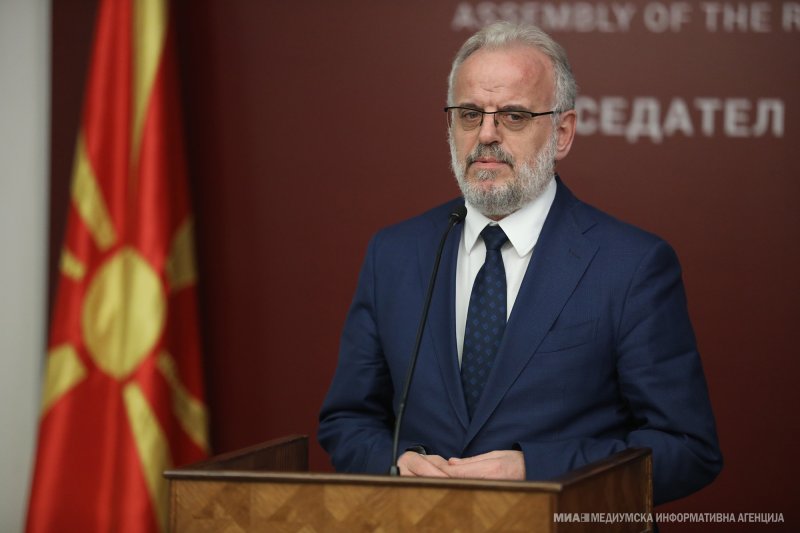The ‘Taboo-breaker’ Talat Xhaferi
In a space of less than eleven years, Talat Xhaferi has become known as a taboo-breaker in his country. First, in 2013, he became the first ethnic Albanian to take over the position of Minister of Defence, taking civilian control over an army he fought in 2001 during the ethnic Albanians’ armed insurgency which resulted with the Ohrid Agreement the same year.
Four years later, Xhaferi took another unlikely position by becoming the first ethnic Albanian elected as parliament speaker.
On January 28 this year, the 61 year old military-turned-politician’s career took another high when he was voted as first ethnic Albanian Prime Minister, leading a technical government until a new one is formed after May elections.
Less than a month after, on February 23, Xhaferi told Kallxo Përnime’s Jeta Xharra in his office in Skopje that his election brings benefits for the Albanian community in North Macedonia as it shows that the Prime Minister’s position “is not reserved exclusively for majority community”.
“A Prime Minister [of North Macedonia] from Albanians is not a utopia. It is real because my election was based on an agreement between the parliamentary majority,” Xhaferi said.
Xhaferi was elected Prime Minister in the backdrop of a tense atmosphere among ethnic Albanian political spectrum as parts of opposition MPs refused to vote him in parliament. While the media have called his election as “historic”, it did not impress many at Kosovo’s state leadership.
Hours after his election, Kosovo’s Prime Minister Albin Kurti took to social networks to issue an evasive congratulatory post and wished that “friendship and cooperation for joint projects be the hallmark of the two governments”.
“Kosovo state leaders congratulated me through Facebook posts but not official routes”, Xhaferi told Kallxo Përnime. A handful of infrastructure projects await implementation with completion of the North Macedonian side Prishtina- Skopje highway as one of the most pressing ones. The 60 kilometers part in Kosovo has already been inaugurated in 2019 while works on the other side, which involve not more than 12 km, have stalled.
“The process for the remaining part is ongoing; the deadline for submitting contractual offers has expired. During this election campaign period, we have restrictions until the completion of the elections. The 2 km section that has begun is near completion. The budget for the remaining part has been secured but we can not sign any document at this phase,” Xhaferi says.
Cold reception from Kurti and his circles culminates months of reports that people close to him will join an opposition bloc for the upcoming parliamentary elections.
In late December 2023, three Albanian opposition parties in North Macedonia – Besa Movement, Alternativa, and Democratic Movement, later joined by the leader of the Alliance for Albanians, Arben Taravari and Bekim Qoku, member of Kosovo’s Vetëvendosje and Kurti’s advisor on North Macedonia issues – announced a joint electoral list for the upcoming parliamentary elections.
When Kurti unofficially visited North Macedonia in August 2023, he opted to meet only a few mayors from opposition, snubbing any meeting with Ali Ahmeti’s Democratic Union for Integration, BDI who has been historically close to PDK and Hashim Thaci. The visit raised eyebrows among North Macedonia’s government. In another visit in mid February this year, Kurti visited Skopje but did not meet Xhaferi who had just been elected Prime Minister. Xhaferi also came to Prishtina in the meantime, but only for an interview with a Kosovo-based TV channel.
This whole to and fro, culminated in a drama when Kosovo Intelligence Agency, AKI, leaked a correspondence it had with Intelligence Agency of North Macedonia, AR, to Kosovo public TV the RTK which reported on 10 of February, that AKI was warning AR of a possibility of an assassination attack on Kurti whole he was visiting North Macedonia on his unofficial visit. The North Macedonia government denied that there was a real threat.
Xhaferi has no dilemma that Kurti has made up his mind to dip his toes in North Macedonia’s elections. “We can’t define it differently than meddling [in elections]… it is perceived like that. I don’t think that this is good for Kosovo or for the party [Vetevendosje],” Xhaferi said.
When asked about the support Kurti is showing for Arben Taravari, the Albanian opposition candidate for President, Xhaferi was short in his reply: “It’s his choice.”
Xhaferi took over duty from his predecessor, the Social Democrat, Dimitar Kovacevski who stepped down to give way for the formation of the technical cabinet tasked with preparing the double presidential and parliamentary elections set for this spring. / Prishtina Insight













